What is telematics and "smart hull". Overview of Russian insurers

According to forecasts, by 2020, two million “smart” auto insurance policies will be sold in Russia. At the same time, the advantages of telematics have now been estimated by 100 million drivers around the world.
The meaning of “smart hull insurance” is to determine the driving style of each car owner and ultimately reduce the price of the policy for the most accurate ones.
Let us examine in more detail who and why the “smart” insurance service in Russia can be useful and which companies offer such services.
Who in Russia works with telematics
AlfaStrakhovanie . The company is positioning the proposal as “Very clever hull insurance”. Employees install a telematics device in the car, after which the driving style is monitored for 3-6 months. Depending on the results, the company can reduce the cost of the CASCO policy by up to 55%. By the way, this is the biggest discount offered by the companies mentioned in the article.
Liberty Insurance . On the company's website, you can find a page where it says that if you already have telematics equipment in your car, the company is ready to offer a discount on the CASCO policy (the amount of the discount is not specified). But in fact, this service is no more - the last time it was active in 2016.

Ingosstrakh . With this company it is necessary to conclude an insurance contract with the option "M-Telematics". The company connects the telematic device to the car for free and also employs a car with already connected devices. The contract is for three months, but if desired, it can be extended by another three, so that there is a correction factor to the premium. For careful driving, you can get a discount of up to 30%, but only at the risk of “Damage” (accidents, hitting an obstacle, broken glass, and so on). This does not apply to hijacking.
Tinkoff Insurance . Here you will be offered a choice of four tariffs, each of which gives its discount on the monthly CASCO policy. The “S” tariff will save 35%, but only if you pass no more than 500 km in a month. Tariff "M" - 20% and 1000 km. The “L” tariff will give a 10% discount at 1,500 km per month, and the “XXL” only 5% discount, but you can ride without restrictions. If you pass more than the set limit, then for each kilometer you will have to pay a separate rate, which is calculated depending on the model of car. And these kilometers will be read by the device that the company installs for you for free. By the way, discounts, as in the case of Ingosstrakh, apply only to the risk of “Damage”.
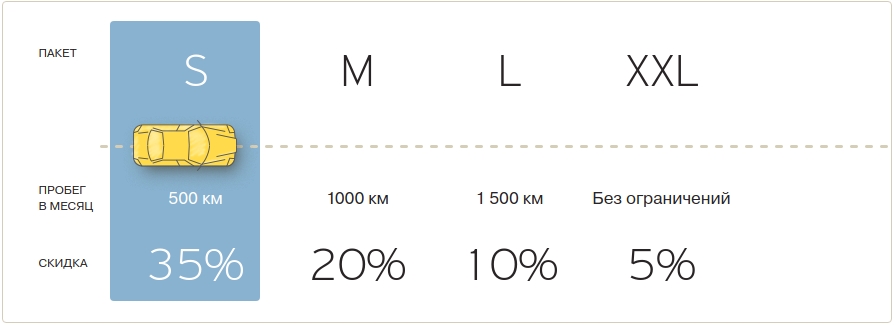
Renaissance Insurance . The company, as she herself writes, provides “a great way to save up to 50%” on insurance of the CASCO policy with telematics. Unfortunately, this great way applies strictly to drivers under 35 years old living in Moscow or St. Petersburg. If drivers accumulate a score from 7.5 to 10 in the first three months, then the company will also completely cancel the CASCO franchise, and from 6.5 to 7.4 points will reduce it by 2 times.
"Consent" . Everything is standard: a maximum discount of up to 30% on the policy, but there is one detail. The driver will have to pay 5,300 rubles a year for servicing the telematic system. It is not quite clear what is meant by "maintenance". Insurance company experts also found it difficult to answer this question. In addition, the contract provides for a mandatory deductible in the amount of 5% of the sum insured, but not less than 25 thousand rubles.
Rosgosstrakh . November 7, 2017, the company announced the "soon launch of telematics." This service is currently not offered.

"Important. New insurance " (IC" Independence "). The company offered to install telematics devices for car owners to reduce the cost of CASCO policies. But November 21, 2016 was declared bankrupt and has no right to carry out insurance activities.
Telematics and insurance in numbers
According to a study by consulting firm J'son & Partners Consulting, by 2020 the penetration of “smart” auto insurance (according to hull insurance) on the Russian market will increase by about 50%. This means that car owners will be much more willing to purchase such policies.
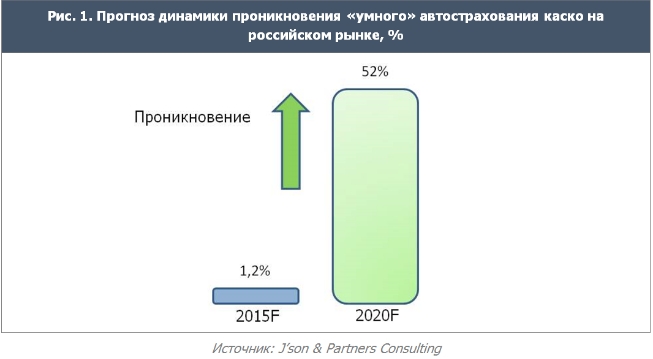
Another consulting company, Ptolemus Consulting Group, also provided a report according to which telematic insurance policy sales will increase substantially in Russia. Their study covers the whole world, but analysts have drawn up a separate schedule for Europe. The lion's share of the total number of "smart" policies accounted for the UK, Italy and Germany. At the same time, Russia is singled out in the list separately, since its share is also highly valued. If you look closely, in 2020, analysts predicted that in our country will be sold about 2 million "smart" policies.
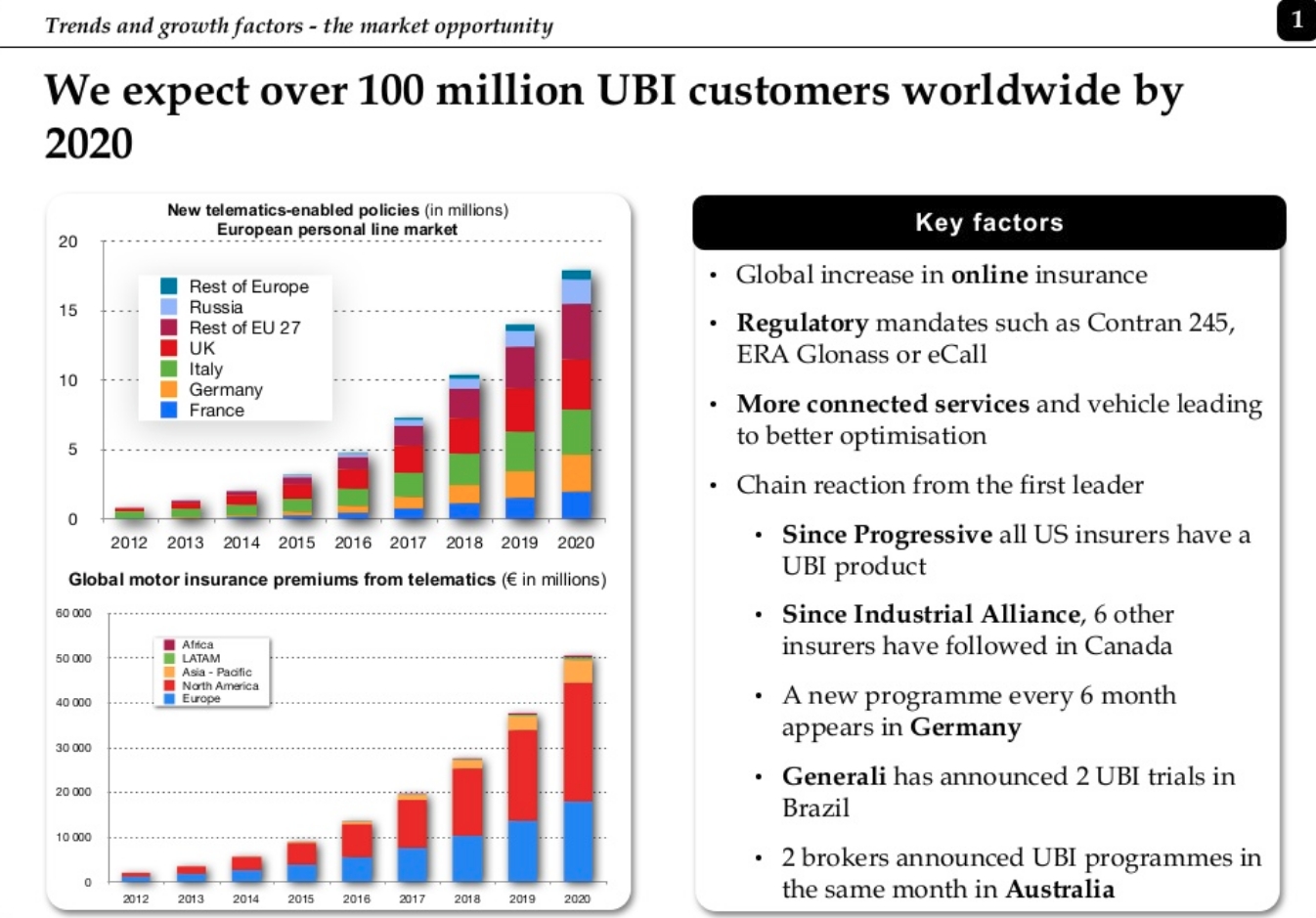
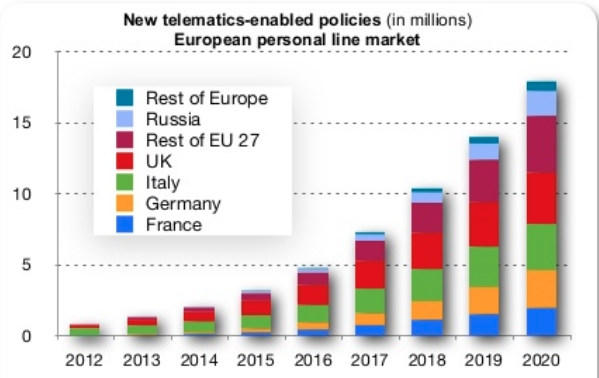
As for North America, the company Berg Insight collected statistics and predicted that in 2020 the countries of this region will sell more than 40 million telematic insurance policies.
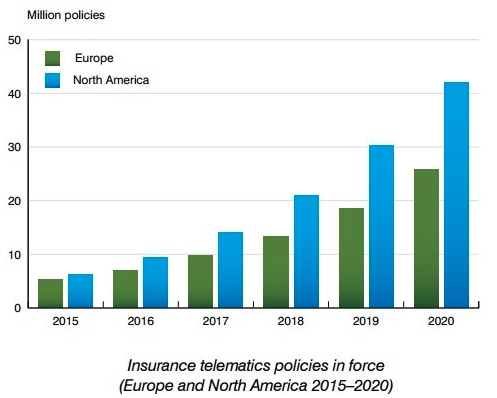
The forecast for the Asia-Pacific region was prepared by Future Market Insights. However, its figures contain data not specifically about insurance, but about the entire automotive telematics market. It will bring to the countries of this region an annual income of $ 50 billion. The growth forecast can be called restrained, but this cannot be said about the income figure.

If you look at the insurance telematics market globally, then J'son & Partners Consulting believes that it will grow by an average of 81%. She predicts that in 2018 107 million people around the world will benefit from such insurance. As for insurance premiums calculated using telematics, they will also show a significant increase.
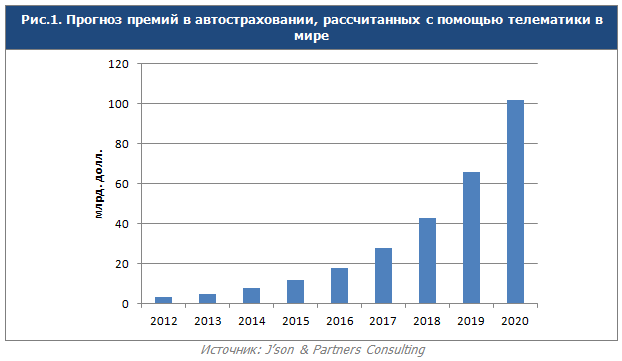
Telematics problems in Russia

According to the consulting company Ptolemus Consulting Group, the most popular parameters that affect the driving rating of the car owner (and, consequently, the insurance policy discount) are acceleration, braking and mileage. Even the speed of movement was secondary. Not to mention the data from the various blocks of the car, which receives the device connected to the OBD.
Adequacy of assessment
Needless to say, each insurance company calculates acceleration rates in its own way? Moreover, hardly anyone of them wants to increase the maximum acceleration rate for the convenience of the driver.
The leader of the Smart Insurance project in StarLine (produces telematics devices) Roman Shafeev about which parameters the device reads.

“Telematic devices are equipped with accelerometers, some can be equipped with gyroscopes. The device itself is connected to the OBD-connector in the car. It reads the odometer, speedometer, engine performance parameters and information from other auto blocks.
Every 10 milliseconds, the mathematical apparatus analyzes the acceleration readings along three axes, taking into account sudden braking, acceleration and turns. All abnormalities are recorded. And with the help of an actual road sign map, speeding is additionally analyzed, ”reports Roman Shafeev.
Severe restrictions
Someone will say that it is necessary not to drive around and drive slowly. I hasten to “rejoice”: the excess even at 1 km / h will be taken into account. Therefore, even a very neat and calm driver risks reducing his rating of a quiet ride. But there is another catch: when you drive much slower than the speed of the general flow, you automatically become not only the epicenter of hate, but also the source of traffic accidents. This is a word that telematics is designed to reduce accidents.
Bad roads
What about the quality of the pavement? Even in million-plus cities, Russian motorists often encounter the deplorable state of roads. You are driving quietly, at a speed of 55 km / h, the road is absolutely empty, but suddenly you notice that a large pit is gaping right in your way. You don't want to lose the wheels, and you quickly turn the steering wheel to avoid an accident. Congratulations, you made a dangerous maneuver and lowered your rating.
Imagine winter
Another point: you are driving in the winter on the road, which is not clean. Moscow residents may be surprised, but not everywhere in Russia snow is regularly removed from the roads. To cover them with reagents, in some regions, even speech is not. So, you are driving on ice. Ahead is a traffic light that changes color to red. You press on the brake, the wheels lightly grind the ice surface, ABS works, and you safely stop in front of the stop line. Think nothing happened? However, not so - you just applied emergency braking, the wheel anti-lock system worked, and your rating was lowered.
Inaccuracy of data
Comes to curiosities. The fact is that telematics devices are equipped with GPS and GLONASS sensors . But satellite navigation is sometimes not different precise definition of coordinates. And some owners, waking up early in the morning, turn on the app on their smartphone and find that their car was driving along an extremely strange route - lawns, garages, rooftops ... Yes, it turns out, the sensors themselves can lie because of failures or technical features.
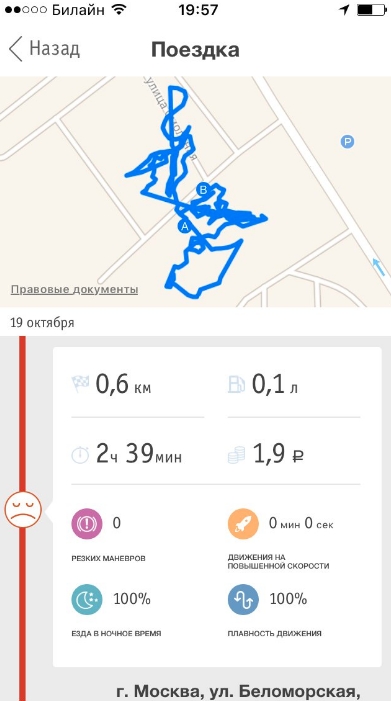


The financial side of the issue
Suppose you are a very calm, considerate and attentive driver. You want to purchase a "smart" insurance policy. What prevents you from doing this? The thing is that, after reading the conditions, you will understand that the benefits here are not so much so that.
“With all the attractiveness of such insurance programs, according to our research, the financial benefit for the client is not obvious. The difference in the cost of an ordinary CASCO policy and a smart telematics policy is not significant, and for some insurers such policies are obviously more expensive. Also, according to our estimates, insurance agents are passive in offering customers CASCO smart policies. This is due to the fact that the smart policy program is relatively new, the insurance risk model is at the formation stage, statistics are accumulated to build an adequate scoring model. In connection with this, insurers overestimate the price of the policy in order to level unforeseen risks, ”says Roman Shafeev.
What is the result?
There are plenty of similar examples. And no matter how I would like to believe in the statistics of famous research companies, in Russia there are certain factors that prevent the spread of telematics in insurance. Even if we discard the factors of bad roads and inadequate sensors, the main thing that stops car owners from buying a CASCO is the cost. Russia needs fundamentally new products, with a tariff setting that is beneficial for the client and not trying to severely restrict the driver. Only then 10 million Russian motorists who refuse voluntary insurance will want to insure their car again.
All Articles